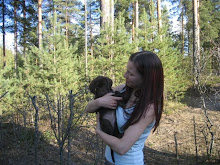
Russian psychologist, Ivan Pavlov, discovered Classical, or in the terminology of behavior analysis respondent conditioning, in 1920s. It seems that classical conditioning was discovered by chance. Pavlov was investigating dog´s digestion when he noticed that the most experienced dogs that he had been testing began to salivate before the samples of food were presented to them. He started to investigate this systematically. Throughout Pavlov´s experiment, dogs were exposed to a wide variety of arbitrary stimuli (example bell and light) presented contiguously with food. Pavlov has a special laboratory constructed in wich the experimenter and a dog were separated from each other in soundproof rooms. Discovery was that conditioned stimulus (bell) began to trigger the same reactiong (salivate) in dogs that unconditioned stimulus (food) did. The associative bond between the conditioned stimulus (CS) and the unconditioned stimulus (US) is strengthened when the CS consistenly occurs just before the representation of the US and is weakened when the CS and US occur indepently of each other. So classical conditioning is unintentional and subconscious reaction to a certain stimuli.
It is important to understand how classical conditioning works and hopefully a few everyday examples will do that. Most dogs respond readily to sound of doorbell ringing and after several repetitions, in which the bell signals the arrival of someone at the door, the dog may begin to example bark. The dog has learned to correlate a previosly insignifant event (doorbell) with a significant on (visitor) and now when the doorbell rings the dog dances with excitement anticipating the visitor´s entry and greetings. But what starts to happen if dogs owner doesn´t open the door when doorbell rings? After several sessions of nonreinforced exposures to the bell, the dog will gradually inhibit its anticipatory reactions and finally ignore the sound altogether. We can say that the conditioned effect has been extinguished.
Classical conditioning has also an important role in the development of anxiety and fears. For instance, dogs easily develope fears associated with the veterinary clinic, expecially if they have undergone painfull procedures there. It may help to prevent negative associations to the veterinary clinic when we provide dogs or puppies treats and other pleasurable experiences while being examined. But what if dog doesnt it eat in that situtation? Its probably too stressed (or not hungry) and you have to start giving food to the dog earlier (example in the hospital parking lot). Lifelong phobic reactions can also occur as the result of a single traumatic event and dogs suffer a broad spectrum of phobic fears, most of which are established and reversed through classical conditioning.
But does Pavlov have anything really good information for us to use in dog training? You may have heard about clicker training. When we examine clicker training through classical contioning, clicker is conditioned stimulus (CS) and food (or some else reinforcement) is unconditioned stimulus (US). Clicker is a mechanical device that makes a short, distinct "click" sound which tells the animal exactly when they're doing the right thing and its combined with positive reinforcement. You can also use something else than clicker, example light, whistle or some other sound. Other important information of Pavlovian conditioning is counterconditioning. It plays avital role in the learning and unlearning of emotial reactions. So in dog training, resolving fears and other problems (example phobias, separation anxiety and aggressiviness), classical conditioning may be required. Classically conditioned responses are largely autonomous and independent of central control, unlike instrumental behavior. Dogs dont choose to feel fearfull or anxious. To be controlled, an aversive emotion like angre or fear, must be countered by the elicitation of an ever stronger and incompatible emotional response.


Dogs for Sale
ReplyDeleteI think this is the perfect place for dog lovers. I am really thankful for providing such an wonderful information. Keep up the good work.